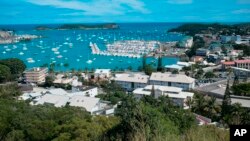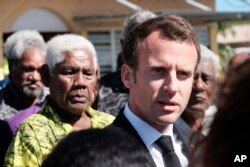New Caledonia, a French archipelago in the South Pacific, votes Sunday on whether to become the world's newest state in a referendum on independence that is the result of a 30-year decolonization process.
It is the first auto-determination vote to be held in a French territory since Djibouti in the Horn of Africa voted for independence in 1977. Tensions have long run deep between pro-independence indigenous Kanaks and descendants of colonial settlers who remain loyal to Paris.
A "yes" vote would not only dent the pride of France, once a colonial power whose reach spanned the Caribbean, sub-Saharan Africa and the Pacific Ocean, but it also would deprive Paris of a foothold in the Indo-Pacific region where China is expanding its presence.
Voters will be asked the question "Do you want New Caledonia to gain full sovereignty and become independent?"
During a visit to the archipelago in May, French President Emmanuel Macron acknowledged the "pains of colonization" and saluted the "dignified" campaign for autonomy led by the Kanaks.
He and his administration have sought to strike a neutral tone on the vote.
The latest polls show that the islands are expected to vote to remain a French territory.
New Caledonia's economy is underpinned by French annual subsidies of 1.3 billion euros ($1.48 billion), nickel deposits that are estimated to represent 25 percent of the world's total, and tourism.
The archipelago and its population of 280,000 already enjoy a large degree of autonomy but depend heavily on France for matters such as defense and education.
First discovered by the British explorer James Cook, the New Caledonia archipelago lies more than 16,700 kilometers (10,377 miles) from metropolitan France. It became a French colony in 1853.
Under colonial rule the Kanaks were confined to reserves and excluded from much of the islands' economy. The first revolt erupted in 1878, not long after the discovery of large nickel deposits that are today exploited by French miner Eramet's subsidiary SLN.
More than 100 years later, in the mid-1980s, fighting broke out between supporters of independence and those who wanted to remain French, amid festering anger over poverty and poor job opportunities.
A 1988 massacre in a cave on the island of Ouvea left 19 indigenous separatists and two French soldiers dead and intensified talks on the island's future. A 1998 deal provided for a referendum on independence to be held by the end of 2018.
Under the terms of the deal, in the event of a “no” vote, two further referenda can be held before 2022.






